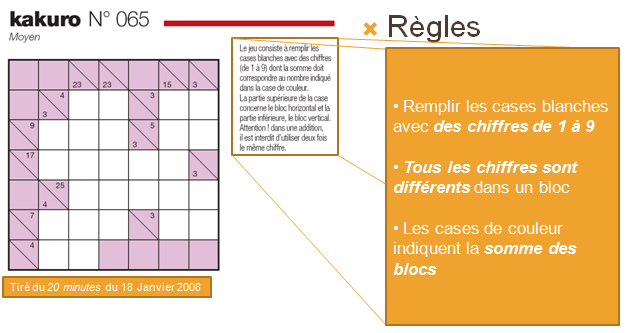TD Exercice 4

Modéliser
le problème et trouver la solution au problème
en utilisant le solveur Choco 2.0.
Solution
Modèle 1
- Pour
chaque case blanche, une variable enumérée
allant de 1 à 9.
- Pour
chaque bloc contigu :
- Une
contrainte linéaire (somme égale à
la valeur fournie).
- Des
contraintes de différences.
Voici
le code java en Choco
2.0 de ce premier modèle :
import
choco.kernel.solver.variables.integer.IntDomainVar;
import choco.kernel.solver.ContradictionException;
import choco.kernel.model.Model;
import choco.kernel.model.variables.integer.IntegerVariable;
import choco.cp.model.CPModel;
import choco.cp.solver.CPSolver;
import choco.Choco;
import java.util.ArrayList;
import java.util.List;
public
class Kakuro {
 static
int[][] instance = new int[][]{
static
int[][] instance = new int[][]{

 new
int[]{-1, -1, 2300, 2300, -1, 1500, 300},
new
int[]{-1, -1, 2300, 2300, -1, 1500, 300},

 new
int[]{-1, 304, 0, 0, 3, 0, 0},
new
int[]{-1, 304, 0, 0, 3, 0, 0},

 new
int[]{9, 0, 0, 0, 305, 0, 0},
new
int[]{9, 0, 0, 0, 305, 0, 0},

 new
int[]{17, 0, 0, 0, 0, 0, 300},
new
int[]{17, 0, 0, 0, 0, 0, 300},

 new
int[]{-1, 425, 0, 0, 0, 0, 0},
new
int[]{-1, 425, 0, 0, 0, 0, 0},

 new
int[]{7, 0, 0, 0, 3, 0, 0},
new
int[]{7, 0, 0, 0, 3, 0, 0},

 new
int[]{4, 0, 0, -1, -1, -1, -1}
new
int[]{4, 0, 0, -1, -1, -1, -1}
 };
};
public static void main(String[] args) {
 // 0- Créons
le modèle
// 0- Créons
le modèle
 Model m
= new CPModel();
Model m
= new CPModel();
 // 1- Créons
les variables
// 1- Créons
les variables
 IntegerVariable[][]
vars;
IntegerVariable[][]
vars;
 vars =
new IntegerVariable[instance.length][];
vars =
new IntegerVariable[instance.length][];
 for (int
i = 0; i < instance.length; i++)
for (int
i = 0; i < instance.length; i++)
 {
{

 int[]
ll = instance[i];
int[]
ll = instance[i];

 vars[i]
= new IntegerVariable[ll.length];
vars[i]
= new IntegerVariable[ll.length];

 for
(int j = 0; j < ll.length; j++)
for
(int j = 0; j < ll.length; j++)

 {
{


 int
val = ll[j];
int
val = ll[j];


 if
(val == 0)
if
(val == 0)


 {
{



 vars[i][j]
= Choco.makeIntVar("x" + i + "_" + j,
1, 9);
vars[i][j]
= Choco.makeIntVar("x" + i + "_" + j,
1, 9);


 }
}

 }
}
 }
}
 int nbLig
= instance.length;
int nbLig
= instance.length;
 int nbCol
= instance[0].length;
int nbCol
= instance[0].length;
 for
(int x = 0; x < nbLig; x++)
for
(int x = 0; x < nbLig; x++)
 {
{

 int
y = 0;
int
y = 0;

 while
(y < nbCol)
while
(y < nbCol)

 {
{


 while
(y < nbCol && instance[x][y] < 0) y++;
while
(y < nbCol && instance[x][y] < 0) y++;


 if
(y < nbCol)
if
(y < nbCol)


 {
{



 if
(instance[x][y] == 0) System.err.println("Probleme
1");
if
(instance[x][y] == 0) System.err.println("Probleme
1");



 int
sum = instance[x][y] % 100;
int
sum = instance[x][y] % 100;



 y++;
y++;



 List<IntegerVariable>
sumVars = new ArrayList<IntegerVariable>();
List<IntegerVariable>
sumVars = new ArrayList<IntegerVariable>();



 while
(y < nbCol && instance[x][y] == 0)
while
(y < nbCol && instance[x][y] == 0)



 {
{




 sumVars.add(vars[x][y]);
sumVars.add(vars[x][y]);




 y++;
y++;



 }
}



 if
(sumVars.size() > 0)
if
(sumVars.size() > 0)



 {
{




 IntegerVariable[]
sumVars2 =
IntegerVariable[]
sumVars2 =





 new
IntegerVariable[sumVars.size()];
new
IntegerVariable[sumVars.size()];




 sumVars2
= sumVars.toArray(sumVars2);
sumVars2
= sumVars.toArray(sumVars2);




 m.addConstraint(Choco.eq(Choco.sum(sumVars2),
sum));
m.addConstraint(Choco.eq(Choco.sum(sumVars2),
sum));




 postAlldiff(m,
sumVars2);
postAlldiff(m,
sumVars2);



 }
}


 }
}

 }
}
 }
}
 for (int
y = 0; y < nbCol; y++)
for (int
y = 0; y < nbCol; y++)
 {
{

 int
x = 0;
int
x = 0;

 while
(x < nbLig)
while
(x < nbLig)

 {
{


 while
(x < nbLig && instance[x][y] < 0)
while
(x < nbLig && instance[x][y] < 0)


 {
{



 x++;
x++;


 }
}


 if
(x < nbLig)
if
(x < nbLig)


 {
{



 if
(instance[x][y] == 0) System.err.println("Probleme
1");
if
(instance[x][y] == 0) System.err.println("Probleme
1");



 int
sum = instance[x][y] / 100;
int
sum = instance[x][y] / 100;



 x++;
x++;



 List<IntegerVariable>
sumVars = new ArrayList<IntegerVariable>();
List<IntegerVariable>
sumVars = new ArrayList<IntegerVariable>();



 while
(x < nbLig && instance[x][y] == 0)
while
(x < nbLig && instance[x][y] == 0)



 {
{




 sumVars.add(vars[x][y]);
sumVars.add(vars[x][y]);




 x++;
x++;



 }
}



 if
(sumVars.size() > 0)
if
(sumVars.size() > 0)



 {
{




 IntegerVariable[]
sumVars2 = new IntegerVariable[sumVars.size()];
IntegerVariable[]
sumVars2 = new IntegerVariable[sumVars.size()];




 sumVars2
= sumVars.toArray(sumVars2);
sumVars2
= sumVars.toArray(sumVars2);




 m.addConstraint(Choco.eq(Choco.sum(sumVars2),
sum));
m.addConstraint(Choco.eq(Choco.sum(sumVars2),
sum));




 postAlldiff(m,
sumVars2);
postAlldiff(m,
sumVars2);



 }
}


 }
}

 }
}
 }
}
 CPSolver
s = new CPSolver();
CPSolver
s = new CPSolver();
 s.read(m);
s.read(m);
 try
try
 {
{

 s.propagate();
s.propagate();
 }
}
 catch (ContradictionException
e)
catch (ContradictionException
e)
 { }
{ }
 for(int
x = 0; x < nbCol; x++)
for(int
x = 0; x < nbCol; x++)
 {
{

 for(int
y = 0; y <nbLig; y++)
for(int
y = 0; y <nbLig; y++)

 {
{


 if
(instance[x][y] == 0)
if
(instance[x][y] == 0)


 {
{



 if
(s.getVar(vars[x][y]).isInstantiated())
if
(s.getVar(vars[x][y]).isInstantiated())




 System.out.print(s.getVar(vars[x][y]).getVal());
System.out.print(s.getVar(vars[x][y]).getVal());



 else
System.out.print("?");
else
System.out.print("?");


 }
}


 else
else


 {
{



 System.out.print("
");
System.out.print("
");


 }
}

 }
}

 System.out.println("");
System.out.println("");
 }
}
 s.solve();
s.solve();
 System.out.println(s.pretty());
System.out.println(s.pretty());
 for(int
x = 0; x < nbCol; x++)
for(int
x = 0; x < nbCol; x++)
 {
{

 for(int
y = 0; y <nbLig; y++)
for(int
y = 0; y <nbLig; y++)

 {
{


 if
(instance[x][y] == 0)
if
(instance[x][y] == 0)


 {
{



 if
(s.getVar(vars[x][y]).isInstantiated())
if
(s.getVar(vars[x][y]).isInstantiated())




 System.out.print(s.getVar(vars[x][y]).getVal());
System.out.print(s.getVar(vars[x][y]).getVal());



 else
System.out.print("?");
else
System.out.print("?");


 }
}


 else
else


 {
{



 System.out.print("
");
System.out.print("
");


 }
}

 }
}

 System.out.println("");
System.out.println("");
 }
}
 s.printRuntimeSatistics();
s.printRuntimeSatistics();
}
private static void postAlldiff(Model m, IntegerVariable[]
vars)
{
 for(int
i = 0; i < vars.length; i++)
for(int
i = 0; i < vars.length; i++)
 {
{

 for(int
j = i+1; j < vars.length; j++)
for(int
j = i+1; j < vars.length; j++)

 {
{


 m.addConstraint(Choco.neq(vars[i],
vars[j]));
m.addConstraint(Choco.neq(vars[i],
vars[j]));

 }
}
 }
}
}
}
Solution
Modèle 2
- Objectif
==> une meilleure propagation : utilisation d'une contrainte
dédiée.
- Pour
cela, on utilise une contrainte générique
avec test :
- Vérification
qu’une valeur apparait une seule fois.
- Vérifier
la somme.
Voici
le code java en Choco
2.0 de ce second modèle :
import
choco.Choco;
import choco.cp.model.CPModel;
import choco.cp.solver.CPSolver;
import choco.kernel.model.Model;
import choco.kernel.model.variables.integer.IntegerVariable;
import choco.kernel.solver.Solver;
import choco.kernel.solver.constraints.integer.extension.LargeRelation;
import choco.kernel.solver.constraints.integer.extension.TuplesTest;
import
java.util.ArrayList;
import java.util.BitSet;
import java.util.List;
public
class KakuroAC {
 static
int[][] instance = new int[][]{
static
int[][] instance = new int[][]{

 new
int[]{-1, -1, 2300, 2300, -1, 1500, 300},
new
int[]{-1, -1, 2300, 2300, -1, 1500, 300},

 new
int[]{-1, 304, 0, 0, 3, 0, 0},
new
int[]{-1, 304, 0, 0, 3, 0, 0},

 new
int[]{9, 0, 0, 0, 305, 0, 0},
new
int[]{9, 0, 0, 0, 305, 0, 0},

 new
int[]{17, 0, 0, 0, 0, 0, 300},
new
int[]{17, 0, 0, 0, 0, 0, 300},

 new
int[]{-1, 425, 0, 0, 0, 0, 0},
new
int[]{-1, 425, 0, 0, 0, 0, 0},

 new
int[]{7, 0, 0, 0, 3, 0, 0},
new
int[]{7, 0, 0, 0, 3, 0, 0},

 new
int[]{4, 0, 0, -1, -1, -1, -1}
new
int[]{4, 0, 0, -1, -1, -1, -1}
 };
};
 public
static void main(String[] args)
public
static void main(String[] args)
 {
{

 Model
m = new CPModel();
Model
m = new CPModel();

 //
1- créons les variables
//
1- créons les variables

 IntegerVariable[][]
vars;
IntegerVariable[][]
vars;

 vars
= new IntegerVariable[instance.length][];
vars
= new IntegerVariable[instance.length][];

 for
(int i = 0; i < instance.length; i++)
for
(int i = 0; i < instance.length; i++)

 {
{


 int[]
ll = instance[i];
int[]
ll = instance[i];


 vars[i]
= new IntegerVariable[ll.length];
vars[i]
= new IntegerVariable[ll.length];


 for
(int j = 0; j < ll.length; j++)
for
(int j = 0; j < ll.length; j++)


 {
{



 int
val = ll[j];
int
val = ll[j];



 if
(val == 0)
if
(val == 0)



 {
{




 vars[i][j]
= Choco.makeIntVar("x" + i + "_" + j,
1, 9);
vars[i][j]
= Choco.makeIntVar("x" + i + "_" + j,
1, 9);



 }
}


 }
}

 }
}

 int
nbLig = instance.length;
int
nbLig = instance.length;

 int
nbCol = instance[0].length;
int
nbCol = instance[0].length;

 for
(int x = 0; x < nbLig; x++)
for
(int x = 0; x < nbLig; x++)

 {
{


 int
y = 0;
int
y = 0;


 while
(y < nbCol)
while
(y < nbCol)


 {
{



 while
(y < nbCol && instance[x][y] < 0) y++;
while
(y < nbCol && instance[x][y] < 0) y++;



 if
(y < nbCol)
if
(y < nbCol)



 {
{




 if
(instance[x][y] == 0) System.err.println("Probleme
1");
if
(instance[x][y] == 0) System.err.println("Probleme
1");




 int
sum = instance[x][y] % 100;
int
sum = instance[x][y] % 100;




 y++;
y++;




 List<IntegerVariable>
sumVars =
List<IntegerVariable>
sumVars =





 new
ArrayList<IntegerVariable>();
new
ArrayList<IntegerVariable>();




 while
(y < nbCol && instance[x][y] == 0)
while
(y < nbCol && instance[x][y] == 0)




 {
{





 sumVars.add(vars[x][y]);
sumVars.add(vars[x][y]);





 y++;
y++;




 }
}




 if
(sumVars.size() > 0)
if
(sumVars.size() > 0)




 {
{





 IntegerVariable[]
sumVars2 =
IntegerVariable[]
sumVars2 =






 new
IntegerVariable[sumVars.size()];
new
IntegerVariable[sumVars.size()];





 sumVars2
= sumVars.toArray(sumVars2);
sumVars2
= sumVars.toArray(sumVars2);





 postConstraint(m,
sumVars, sum);
postConstraint(m,
sumVars, sum);




 }
}



 }
}


 }
}

 }
}

 for
(int y = 0; y < nbCol; y++)
for
(int y = 0; y < nbCol; y++)

 {
{


 int
x = 0;
int
x = 0;


 while
(x < nbLig)
while
(x < nbLig)


 {
{



 while
(x < nbLig && instance[x][y] < 0) x++;
while
(x < nbLig && instance[x][y] < 0) x++;



 if
(x < nbLig)
if
(x < nbLig)



 {
{




 if
(instance[x][y] == 0) System.err.println("Probleme
1");
if
(instance[x][y] == 0) System.err.println("Probleme
1");




 int
sum = instance[x][y] / 100;
int
sum = instance[x][y] / 100;




 x++;
x++;




 List<IntegerVariable>
sumVars =
List<IntegerVariable>
sumVars =





 new
ArrayList<IntegerVariable>();
new
ArrayList<IntegerVariable>();




 while
(x < nbLig && instance[x][y] == 0)
while
(x < nbLig && instance[x][y] == 0)




 {
{





 sumVars.add(vars[x][y]);
sumVars.add(vars[x][y]);





 x++;
x++;




 }
}




 if
(sumVars.size() > 0)
if
(sumVars.size() > 0)




 {
{





 IntegerVariable[]
sumVars2 =
IntegerVariable[]
sumVars2 =






 new
IntegerVariable[sumVars.size()];
new
IntegerVariable[sumVars.size()];





 sumVars2
= sumVars.toArray(sumVars2);
sumVars2
= sumVars.toArray(sumVars2);





 postConstraint(m,
sumVars, sum);
postConstraint(m,
sumVars, sum);




 }
}



 }
}


 }
}

 }
}

 Solver
s = new CPSolver();
Solver
s = new CPSolver();

 s.read(m);
s.read(m);

 s.solve();
s.solve();

 System.out.println(s.pretty());
System.out.println(s.pretty());

 for(int
x = 0; x < nbCol; x++)
for(int
x = 0; x < nbCol; x++)

 {
{


 for(int
y = 0; y <nbLig; y++)
for(int
y = 0; y <nbLig; y++)


 {
{



 if
(instance[x][y] == 0)
if
(instance[x][y] == 0)



 {
{




 if
(s.getVar(vars[x][y]).isInstantiated())
if
(s.getVar(vars[x][y]).isInstantiated())





 System.out.print(s.getVar(vars[x][y]).getVal());
System.out.print(s.getVar(vars[x][y]).getVal());




 else
System.out.print("?");
else
System.out.print("?");



 }
}



 else
else



 {
{




 System.out.print("
");
System.out.print("
");



 }
}


 }
}


 System.out.println("");
System.out.println("");

 }
}

 s.printRuntimeSatistics();
s.printRuntimeSatistics();
 }
}
 private
static void postConstraint(Model m,
private
static void postConstraint(Model m,








 List<IntegerVariable>
sumVars, final int sum)
List<IntegerVariable>
sumVars, final int sum)
 {
{

 IntegerVariable[]
vars = new IntegerVariable[0];
IntegerVariable[]
vars = new IntegerVariable[0];

 vars
= sumVars.toArray(vars);
vars
= sumVars.toArray(vars);

 m.addConstraint(
m.addConstraint(


 Choco.relationTupleAC(vars,
new TuplesTest()
Choco.relationTupleAC(vars,
new TuplesTest()


 {
{



 public
boolean checkTuple(int[] tuple)
public
boolean checkTuple(int[] tuple)



 {
{




 int
s = 0;
int
s = 0;




 BitSet
bs = new BitSet();
BitSet
bs = new BitSet();




 for
(int v : tuple)
for
(int v : tuple)




 {
{





 if
(bs.get(v)) return false;
if
(bs.get(v)) return false;





 bs.set(v);
bs.set(v);





 s
+= v;
s
+= v;




 }
}




 return
s == sum;
return
s == sum;



 }
}


 })
})

 );
);
 }
}
}
Voici
le plan de cette présentation sur la programmation par contraintes
- Les
notions de base
:
- Quelques
notions avancées :
- Quelques
exemples pour utiliser la P.P.C. :
Cette page
a été co-réalisée avec Guillaume
Rochart, docteur en mathématiques dans mon équipe de
recherche au Bouygues
e-lab.10/03/2009.
